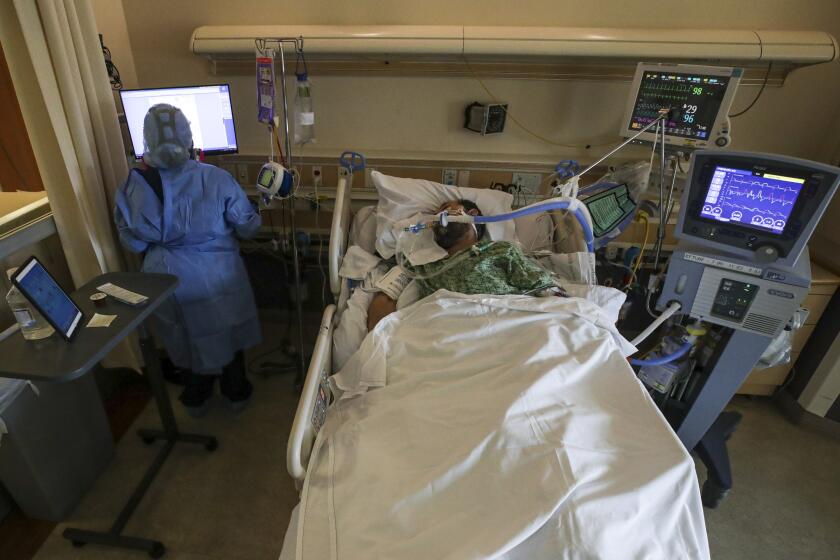Study Finds Breast Exam Is as Useful as Mammogram
A breast examination by a specially trained physician or nurse may not detect as many tumors as a mammogram in a woman older than 50, but it is equally effective at keeping her alive, according to Canadian researchers.
The study highlights a controversy that has developed as new X-ray techniques have given physicians the ability to see ever smaller tumors. The sensitive X-rays identify small tumors, triggering further--and unnecessary--exploratory tests that often show the tumors are not a risk. That was the conclusion of a recent study using X-rays to detect lung tumors, and that appears to be the conclusion reached in the new Canadian study.
But the study, reported in the Sept. 20 Journal of the National Cancer Institute (https://jnci.oupjournals.org), is the only one of seven major studies that has not shown a distinct advantage for mammography, and both the American Cancer Society and the American Medical Society stand by their recommendation that women have yearly mammograms.
Dr. Cornelia J. Baines of the University of Toronto and her colleagues enrolled 39,405 volunteers, age 50 to 59, who were randomly divided into two groups: one that periodically received both mammography and careful physical examinations, and one that received only the physical exams. The patients were enrolled between 1980 and 1985 and followed for an average of 13 years.
By the end of 1993, the team reported, it had found 622 invasive tumors in the mammography group and 610 in the physical exam group. Another 71 noninvasive tumors were identified in the mammography group, compared with only 16 in the physical examination group. But the number of deaths in the two groups were virtually identical, 107 in the mammography group and 105 in the exam-only group.
Kid at Risk if Parent Had Premature Heart Attack
The offspring of people who suffer premature heart attacks--that is, before age 60--have blood vessel abnormalities previously shown to lead to atherosclerosis, according to an Italian and American research team. The findings indicate that children of such heart attack victims should be carefully monitored to reduce other risk factors for the disease.
Dr. Maurizio Trevisan of State University of New York at Buffalo and colleagues at Wake Forest Baptist Medical Center in Naples studied 40 healthy individuals between the ages of 6 and 30 with a parental history of premature heart attack. The researchers compared them with 40 similar people with no family history of heart disease.
The team reported in the Sept. 21 New England Journal of Medicine (https://www.nejm.com) that the blood vessels of children whose parent had suffered a heart attack were, on average, 11% thicker than those of the control subjects and were 55% less reactive. Reactivity is a measure of how quickly blood flow increases after a blood-pressure cuff is relaxed and is a measure of the flexibility of the vessels.
No Link Found Between Gum and Heart Disease
A wide variety of evidence suggests that certain bacterial and viral infections can increase the risk of heart disease, either by infecting blood vessels directly or by triggering inflammatory responses that cause clogging of arteries. Among the suspects are cytomegalovirus, chlamydia and the bacteria that cause periodontal disease.
A new study, however, appears to eliminate the mouth bacteria.
Dr. Philippe Hujoel of the University of Washington and his colleagues examined data on 8,032 adults, ages 25 to 74, who participated in a national health study from 1982 to 1992. None of those they studied had heart disease at the beginning of the study, but about half had mild or advanced gum disease.
The team reported in the Sept. 20 Journal of the American Medical Assn. (https://jama.ama-assn.org) that 1,265 of the subjects had at least one coronary heart disease event, including heart attacks, bypass surgery and hospitalization for heart disease.
But those with gum disease were also much more likely to be low-income, black, older and overweight, all of which increase the risk of heart disease. When these factors were taken into account, the researchers concluded that those with gum disease had no higher risk of heart disease than those without it.
If there is a link, Hujoel said, “it is very small or very hard to reliably detect.”
In Test, Herpes Vaccine Results Vary by Gender
An experimental herpes vaccine is partially protective in women but has no benefits in men, according to a new study. The results mark the first time that a vaccine has been found to have different effects in the two sexes, and may have implications for the development of vaccines against other sexually transmitted diseases, such as HIV.
Dr. Spotswood Spruance of the University of Utah and his colleagues tested the vaccine in more than 2,700 couples, in the U.S. and abroad, in which one partner had genital herpes and the other did not. In one group, the uninfected partner had previously been infected with oral herpes, which causes cold sores; in the other, the partner had not been infected with either oral or genital herpes.
Spruance reported last week at a meeting of the American Society for Microbiology in Toronto that the vaccine provided no benefits to either males or females who had previously been infected with oral herpes. It also had no benefits for previously uninfected males.
But it did prove about 75% effective in women who had never had either form of the virus. About 3% of those women got genital herpes after taking the vaccine, compared with 11% of those who received dummy shots.
Researchers speculated that the vaccine increased mucosal immunity in the vagina but did nothing to protect against blood-borne infections in men.
*
Medical writer Thomas H. Maugh II can be reached at thomas.maugh@latimes.com.



